Lesson 48 Li Ming’s Summer Holiday 教学设计
文档属性
| 名称 | Lesson 48 Li Ming’s Summer Holiday 教学设计 |
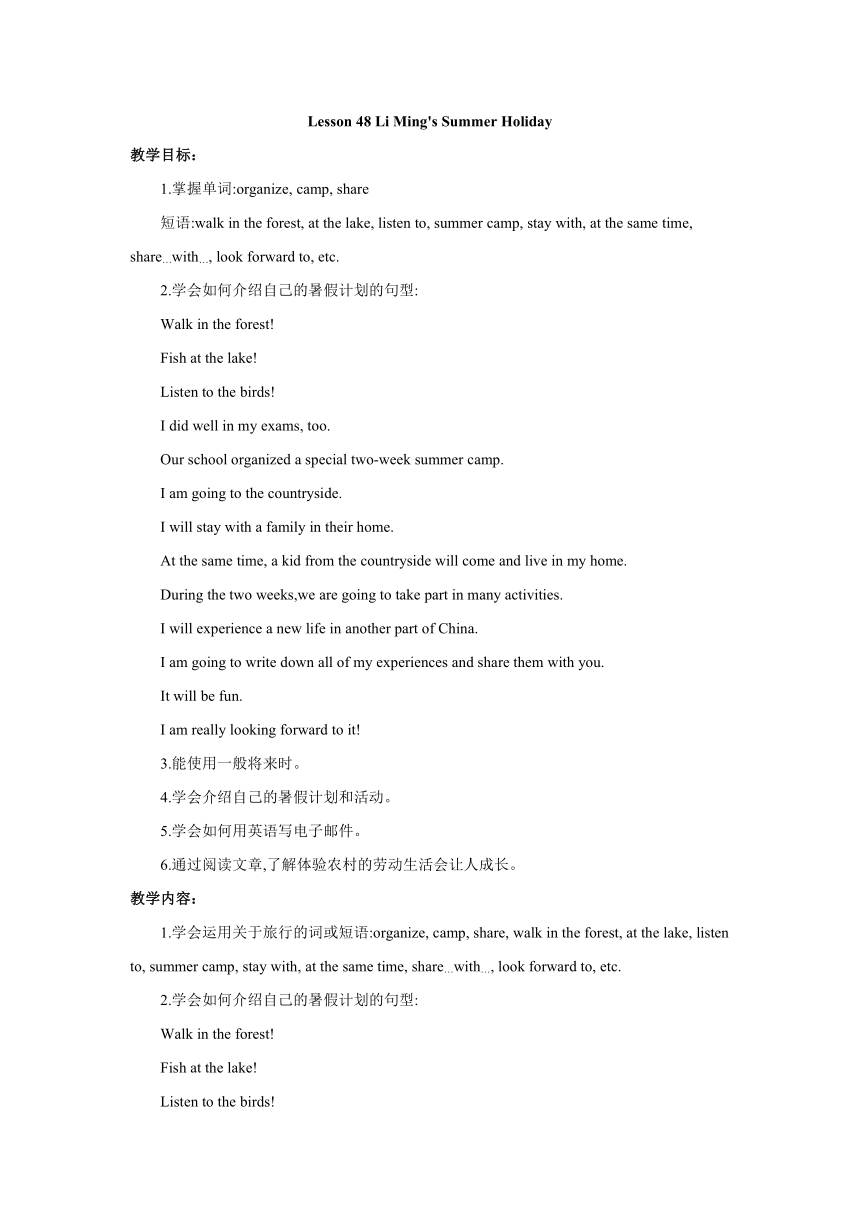
|
|
| 格式 | zip | ||
| 文件大小 | 31.8KB | ||
| 资源类型 | 教案 | ||
| 版本资源 | 冀教版 | ||
| 科目 | 英语 | ||
| 更新时间 | 2019-06-27 17:30:24 | ||
图片预览

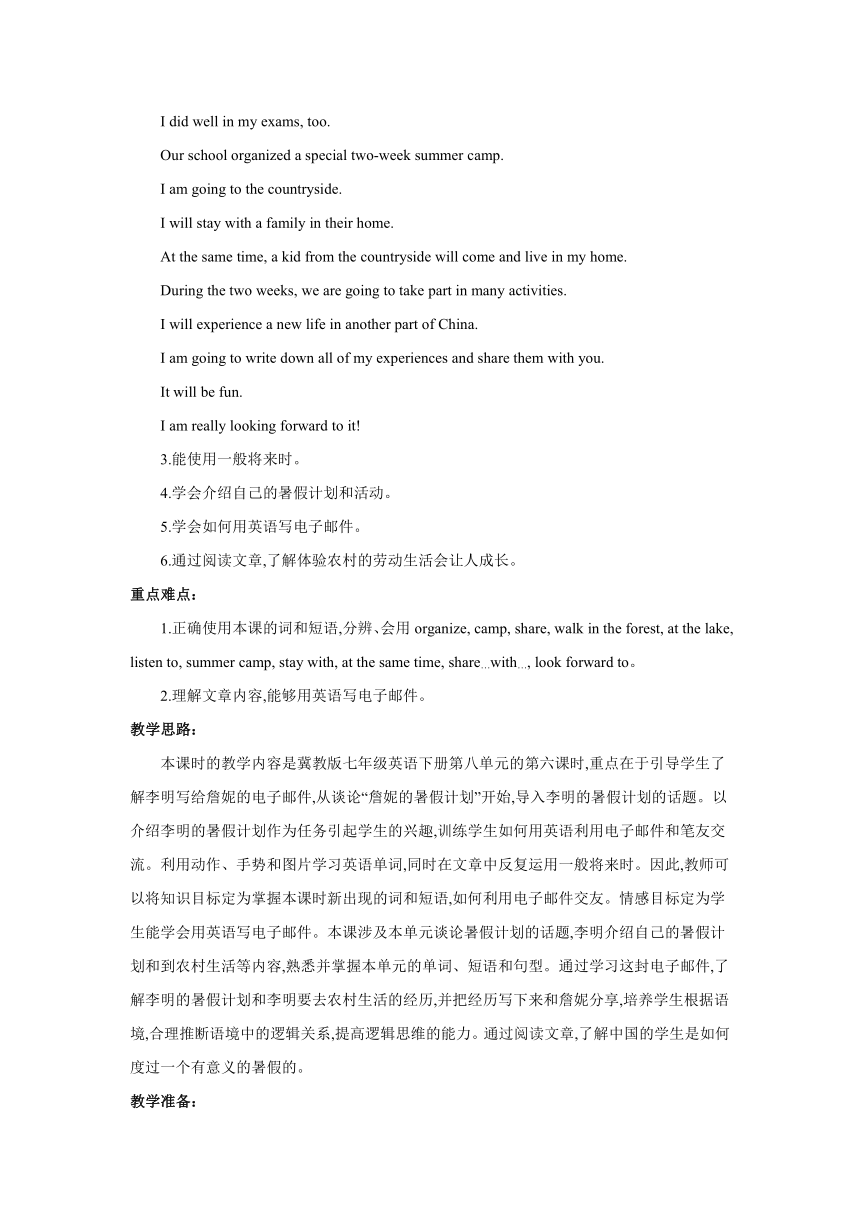
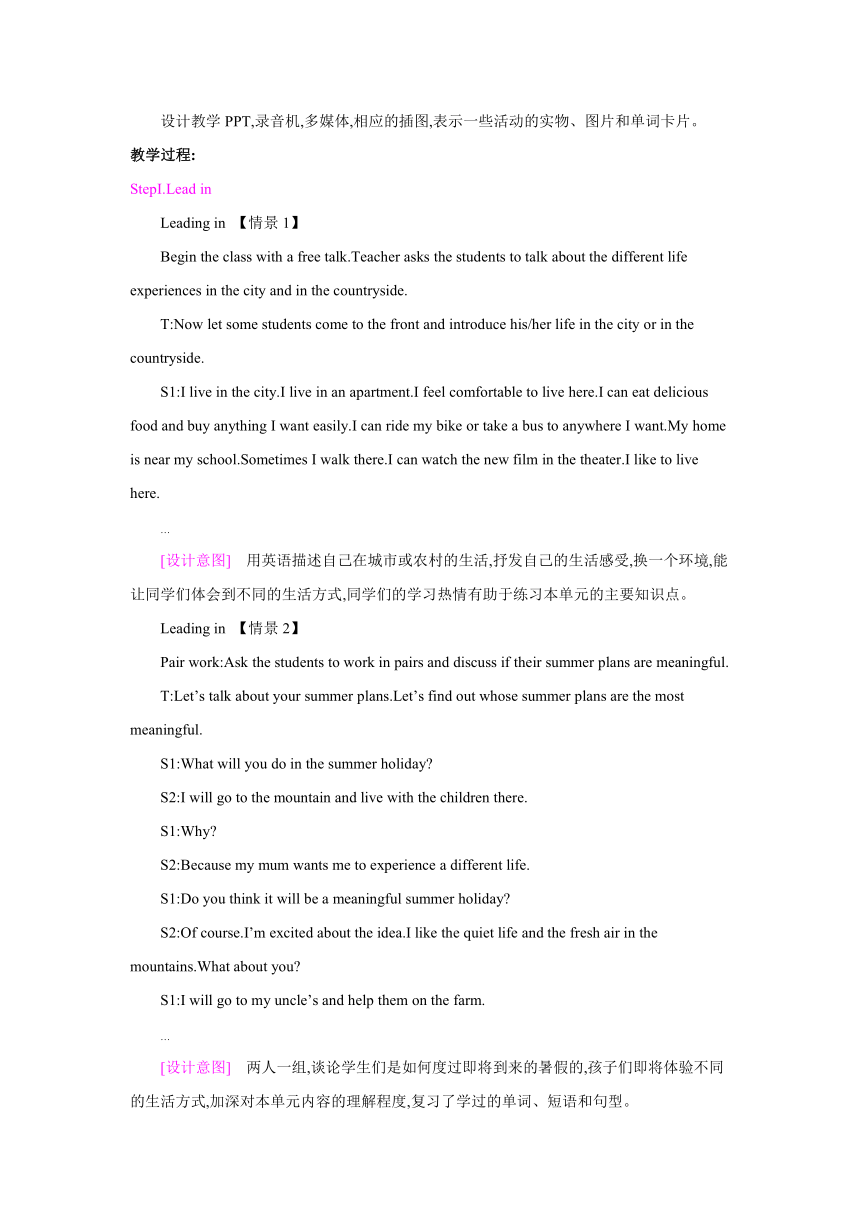
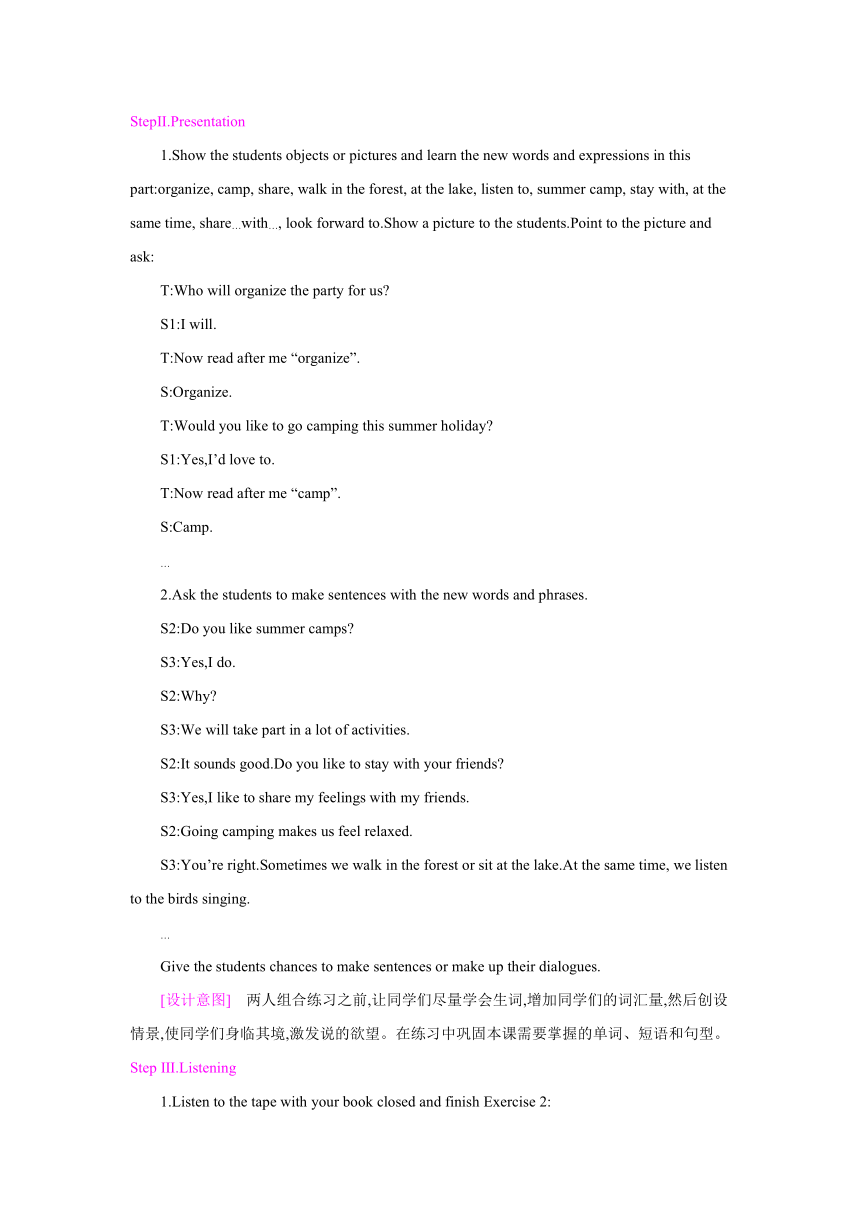
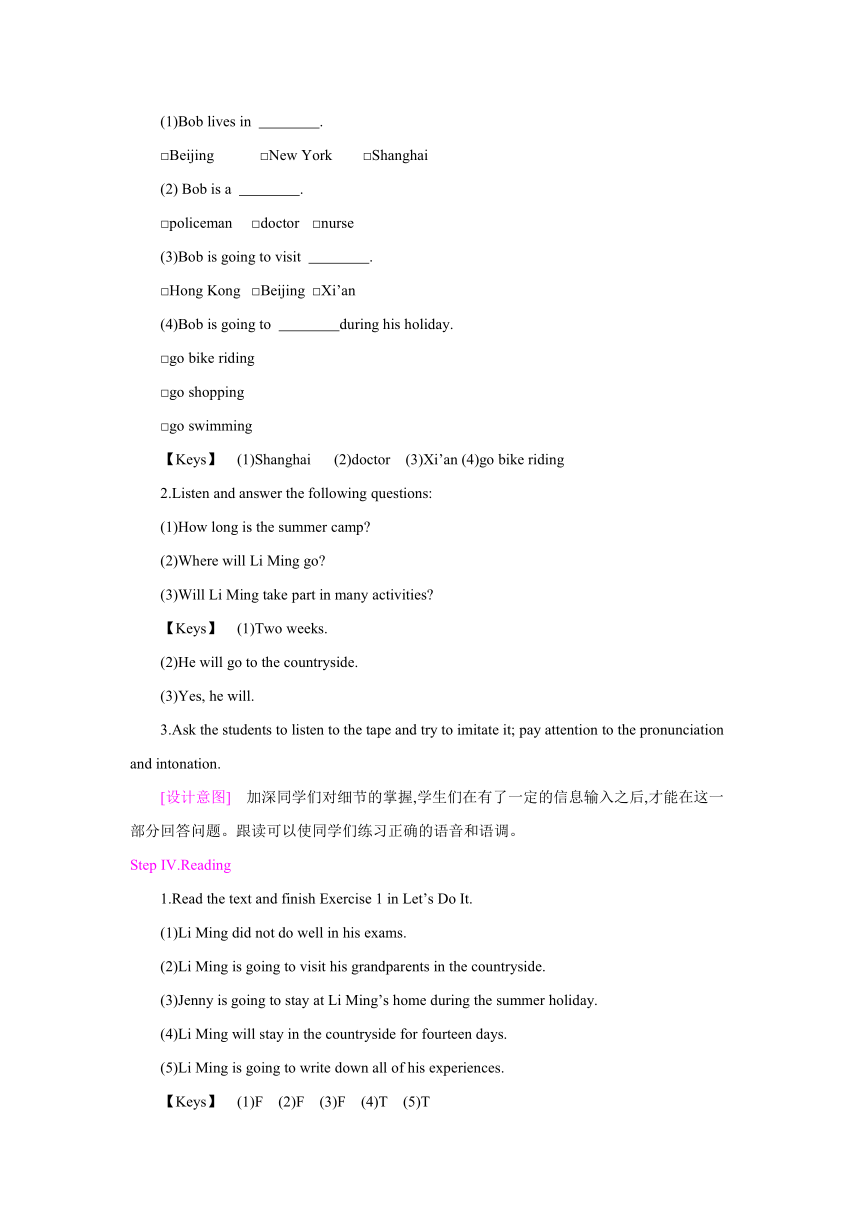
文档简介
Lesson 48 Li Ming's Summer Holiday
教学目标:
1.掌握单词:organize, camp, share
短语:walk in the forest, at the lake, listen to, summer camp, stay with, at the same time, share…with…, look forward to, etc.
2.学会如何介绍自己的暑假计划的句型:
Walk in the forest!
Fish at the lake!
Listen to the birds!
I did well in my exams, too.
Our school organized a special two-week summer camp.
I am going to the countryside.
I will stay with a family in their home.
At the same time, a kid from the countryside will come and live in my home.
During the two weeks,we are going to take part in many activities.
I will experience a new life in another part of China.
I am going to write down all of my experiences and share them with you.
It will be fun.
I am really looking forward to it!
3.能使用一般将来时。
4.学会介绍自己的暑假计划和活动。
5.学会如何用英语写电子邮件。
6.通过阅读文章,了解体验农村的劳动生活会让人成长。
教学内容:
1.学会运用关于旅行的词或短语:organize, camp, share, walk in the forest, at the lake, listen to, summer camp, stay with, at the same time, share…with…, look forward to, etc.
2.学会如何介绍自己的暑假计划的句型:
Walk in the forest!
Fish at the lake!
Listen to the birds!
I did well in my exams, too.
Our school organized a special two-week summer camp.
I am going to the countryside.
I will stay with a family in their home.
At the same time, a kid from the countryside will come and live in my home.
During the two weeks, we are going to take part in many activities.
I will experience a new life in another part of China.
I am going to write down all of my experiences and share them with you.
It will be fun.
I am really looking forward to it!
3.能使用一般将来时。
4.学会介绍自己的暑假计划和活动。
5.学会如何用英语写电子邮件。
6.通过阅读文章,了解体验农村的劳动生活会让人成长。
重点难点:
1.正确使用本课的词和短语,分辨、会用organize, camp, share, walk in the forest, at the lake, listen to, summer camp, stay with, at the same time, share…with…, look forward to。
2.理解文章内容,能够用英语写电子邮件。
教学思路:
本课时的教学内容是冀教版七年级英语下册第八单元的第六课时,重点在于引导学生了解李明写给詹妮的电子邮件,从谈论“詹妮的暑假计划”开始,导入李明的暑假计划的话题。以介绍李明的暑假计划作为任务引起学生的兴趣,训练学生如何用英语利用电子邮件和笔友交流。利用动作、手势和图片学习英语单词,同时在文章中反复运用一般将来时。因此,教师可以将知识目标定为掌握本课时新出现的词和短语,如何利用电子邮件交友。情感目标定为学生能学会用英语写电子邮件。本课涉及本单元谈论暑假计划的话题,李明介绍自己的暑假计划和到农村生活等内容,熟悉并掌握本单元的单词、短语和句型。通过学习这封电子邮件,了解李明的暑假计划和李明要去农村生活的经历,并把经历写下来和詹妮分享,培养学生根据语境,合理推断语境中的逻辑关系,提高逻辑思维的能力。通过阅读文章,了解中国的学生是如何度过一个有意义的暑假的。
教学准备:
设计教学PPT,录音机,多媒体,相应的插图,表示一些活动的实物、图片和单词卡片。
教学过程:
StepⅠ.Lead in
Leading in 【情景1】
Begin the class with a free talk.Teacher asks the students to talk about the different life experiences in the city and in the countryside.
T:Now let some students come to the front and introduce his/her life in the city or in the countryside.
S1:I live in the city.I live in an apartment.I feel comfortable to live here.I can eat delicious food and buy anything I want easily.I can ride my bike or take a bus to anywhere I want.My home is near my school.Sometimes I walk there.I can watch the new film in the theater.I like to live here.
…
[设计意图] 用英语描述自己在城市或农村的生活,抒发自己的生活感受,换一个环境,能让同学们体会到不同的生活方式,同学们的学习热情有助于练习本单元的主要知识点。
Leading in 【情景2】
Pair work:Ask the students to work in pairs and discuss if their summer plans are meaningful.
T:Let’s talk about your summer plans.Let’s find out whose summer plans are the most meaningful.
S1:What will you do in the summer holiday?
S2:I will go to the mountain and live with the children there.
S1:Why?
S2:Because my mum wants me to experience a different life.
S1:Do you think it will be a meaningful summer holiday?
S2:Of course.I’m excited about the idea.I like the quiet life and the fresh air in the mountains.What about you?
S1:I will go to my uncle’s and help them on the farm.
…
[设计意图] 两人一组,谈论学生们是如何度过即将到来的暑假的,孩子们即将体验不同的生活方式,加深对本单元内容的理解程度,复习了学过的单词、短语和句型。
StepⅡ.Presentation
1.Show the students objects or pictures and learn the new words and expressions in this part:organize, camp, share, walk in the forest, at the lake, listen to, summer camp, stay with, at the same time, share…with…, look forward to.Show a picture to the students.Point to the picture and ask:
T:Who will organize the party for us?
S1:I will.
T:Now read after me “organize”.
S:Organize.
T:Would you like to go camping this summer holiday?
S1:Yes,I’d love to.
T:Now read after me “camp”.
S:Camp.
…
2.Ask the students to make sentences with the new words and phrases.
S2:Do you like summer camps?
S3:Yes,I do.
S2:Why?
S3:We will take part in a lot of activities.
S2:It sounds good.Do you like to stay with your friends?
S3:Yes,I like to share my feelings with my friends.
S2:Going camping makes us feel relaxed.
S3:You’re right.Sometimes we walk in the forest or sit at the lake.At the same time, we listen to the birds singing.
…
Give the students chances to make sentences or make up their dialogues.
[设计意图] 两人组合练习之前,让同学们尽量学会生词,增加同学们的词汇量,然后创设情景,使同学们身临其境,激发说的欲望。在练习中巩固本课需要掌握的单词、短语和句型。
Step Ⅲ.Listening
1.Listen to the tape with your book closed and finish Exercise 2:
(1)Bob lives in .?
□Beijing □New York □Shanghai
(2) Bob is a .?
□policeman □doctor □nurse
(3)Bob is going to visit .?
□Hong Kong □Beijing □Xi’an
(4)Bob is going to during his holiday.?
□go bike riding
□go shopping
□go swimming
【Keys】 (1)Shanghai (2)doctor (3)Xi’an (4)go bike riding
2.Listen and answer the following questions:
(1)How long is the summer camp?
(2)Where will Li Ming go?
(3)Will Li Ming take part in many activities?
【Keys】 (1)Two weeks.
(2)He will go to the countryside.
(3)Yes, he will.
3.Ask the students to listen to the tape and try to imitate it; pay attention to the pronunciation and intonation.
[设计意图] 加深同学们对细节的掌握,学生们在有了一定的信息输入之后,才能在这一部分回答问题。跟读可以使同学们练习正确的语音和语调。
Step Ⅳ.Reading
1.Read the text and finish Exercise 1 in Let’s Do It.
(1)Li Ming did not do well in his exams.
(2)Li Ming is going to visit his grandparents in the countryside.
(3)Jenny is going to stay at Li Ming’s home during the summer holiday.
(4)Li Ming will stay in the countryside for fourteen days.
(5)Li Ming is going to write down all of his experiences.
【Keys】 (1)F (2)F (3)F (4)T (5)T
2.Group work:Read the text first, then ask at least 3 questions.After a while, you can ask anyone in your class to answer your questions.
Group 1:
S4:Who will walk in the forest, fish at the lake and listen to the birds?
S5:Who will live in Li Ming’s home?
S6:What will Li Ming do with his experiences?
…
【Keys】 S4:Li Ming.
S5:A kid from the countryside.
S6:He will write down all of his experiences and share them with Jenny.
…
3.Read and find the key points.
The following language points should be explained.
☆教材解读☆
1.Our school organized a special two-week summer camp.?
◆organize动词,意为“组织”,后接名词作宾语,其名词形式为organization,意为“组织”;形容词是organized,意为“有组织的”。
Lily helped me organize the meeting.
莉莉帮助我组织了这次会议。
We will organize a speech contest.
我们将组织一次演讲比赛。
We have some organized activities in our school.在我们学校有一些有组织的活动。
◆two-week意为“两周的”, 用作形容词,在句中只能作定语。它的同义短语是two weeks’。
They will have a seven-day holiday during the National Day.在国庆节期间他们将会有一个七天的假期。
It’s about five-minute walk from my home to school.从我家到学校大约五分钟的路程。
【注意】 “数词+名词”组成的形容词,里面的名词必须用单数。
2.I will experience a new life in another part of China.?
◆experience在句中用作动词,意为“经历”。
We don’t know what the boy experienced in the mountains alone.我们不知道男孩一个人在山里经历了什么。
◆【辨析】 other, the other, others, the others,another
(1)other可作形容词或代词,作形容词时,意思是“别的,其他”,泛指“其他的(人或物)”。
Do you have any other question(s)?
你还有其他问题吗?
Ask some other people.问问别人吧!
(2)the other指两个人或物中的一个,此时的other作代词。
He has two daughters.One is a nurse, the other is a worker.他有两个女儿。一个是护士,另一个是工人。
【拓展】 the other后可加单数名词,也可加复数名词,此时的other作形容词。
On the other side of the street,there is a tall tree.在街道的另一边,有一棵大树。
Mary is much taller than the other girls.
玛丽比其他的女孩高得多。
He lives on the other side of the river.
他住在河的对岸。
(3)others是other的复数形式,泛指“另外几个,其余的”。在句中可作主语、宾语。
Give me some others, please!
请给我别的东西吧!
There are no others.没有别的了。
(4)the others意思是“其他东西,其余的人”。特指某一范围内的“其他的(人或物)”,是the other的复数形式。
Two boys will go to the zoo, and the others will stay at home.两个男孩将去动物园,其余的留在家里。
【拓展】 the others=the other +复数名词。
(5)another既可作形容词,也可作代词,只能用于三个或更多的人或物,泛指同类事物中的三者或三者以上的“另一个”,只能代替或修饰单数可数名词。
I don’t like this one.Please show me another.我不喜欢这一个。请给我看看另一个。
3.I am going to write down all of my experiences and share them with you.?
◆share 动词,意为“分享,合用”,常构成短语share…with…,意为“与……分享……”。share in分享;分担。
Lily shares the bedroom with her sister.
莉莉和她姐姐一起住这间卧室。
I share my lunch with Mike.
我和迈克分享午饭。
She always shares in my joy and sadness.
她总是分担我的欢乐和忧愁。
◆write down意为“写下;记下”,接名词时,名词可以放在down的后面,也可以放在中间,接代词时,代词必须放在中间。
The students write the teacher’s words down.学生们把老师的话写下来。
Must I write them down?
我必须把它们写下来吗?
[设计意图] 学生在听了细节之后,朗读巩固,训练学生的语音、语调;再根据课文内容提出问题,增加学生对课文的理解程度。
Step Ⅴ.Practice
1.Ask the students to read the passage.Students read the passage aloud.Focus on the stressed words, pronunciation and intonation.
2.Work in groups.Ask the students to write an email to his/her friends about his/her summer plans.Talk about them.
3.Ask the students to retell the passage with their own words.
4.Make sentences with the new words, expressions and drills of this lesson.
[设计意图] 小组合作,让同学们关于他们的暑假计划给朋友们写一封电子邮件。根据情景造句可以培养学生运用目标语言进行交际的能力。
Step Ⅵ.Complete Let’s Do It!
Exercise 1 is about reading part.We have finished it in class.Exercise 2 is used for practicing the students’ listening ability.The students have finished it in class.Let the students finish Exercise 3 in class.Check the answers in class.
[设计意图] Let’s Do It!部分中的Exercise 1重点是阅读教学,了解课文的基本内容。我们在听力部分已经完成了。Exercise 2是一个听力练习,我们在课上也已经完成了。Exercise 3考查同学们对语法——一般将来时的掌握程度。
Step Ⅶ.Task
Work in pairs.Suppose you will go on your dream summer holiday.Write about it.
Task tips:Where will you go?How will you get there? Who will you go with? What will you do there? How long will you stay there?
[设计意图] Exercise 4描写自己梦想的暑假计划,你想去哪,怎么去那,和谁去,你要在那做什么,在那待多长时间。Exercise 4提供了一个同学们交流的平台,自然呈现本单元的核心句型,为学生进一步输出语言提供了口语示范。
Step Ⅷ.Exercises
Fill in the blanks with the correct forms of the given words.
organize, share, activity, experience, listen
1.You can your happiness with your partner.?
2.I will write down all of my in the countryside.?
3.Our school often some special activities for students in the summer holiday.?
4.We are going to have many this term.?
5.I like reading books and to music after class.?
【Keys】 1.share 2.experiences 3.organizes 4.activities 5.listening
[设计意图] 以学评教、强化落实。当堂检测主要是由本节内容组成的形成性评价,检测本课的重点单词、短语和句型,让学生们得到充分的训练。
Step Ⅸ.Homework
1.Review and recite the important points of this lesson.
2.Try to write an email to your friend about your summer plans.
3.Preview the next lesson.
[设计意图] 口头练习和单词记忆相结合,复习、归纳,注重语言知识的操练与积累。给你的朋友写一封关于你的暑假计划的电子邮件。
Lesson 48 Li Ming’s Summer Holiday
organize, camp, share, walk in the forest,
at the lake, listen to, summer camp,
stay with, at the same time,
share…with…, look forward to
Walk in the forest!
I will stay with a family in their home.
Fish at the lake!
I am going to the countryside.
Listen to the birds!
I did well in my exams, too.
It will be fun.
I am really looking forward to it!
I will experience a new life in another part of China.
Our school organized a special two-week summer camp.
During the two weeks, we are going to take part in many activities.
I am going to write down all of my experiences and share them with you.
At the same time, a kid from the countryside will come and live in my home.
教材习题答案
【Keys】 3 2.No,I’m not.I am going to do my homework after dinner./Yes, I am.
3.No,I won’t.I have to clean the house for the family this evening./Yes, I will.
4.No,I am not.I am going to visit my aunt and uncle this weekend./Yes, I am.
5.No,I won’t.I will fish at the river./Yes, I will.
6.No,I won’t.I will go to the village this summer./Yes, I will.
语法精讲
一般将来时
(一)概念
一般将来时表示将来某个特定时间将要发生的动作或存在的状态。
I am going to/shall watch a football match on TV this evening.今天晚上我将在电视上看一场足球比赛。
(二)谓语动词形式
1. “will/shall + 动词原形”用来表示说话时认为或预测将来发生的动作或状态。will可用于所有人称,但shall 仅用于第一人称I和we。以You and I为主语时通常避免用shall。
I shall/will be free on Sunday.星期天我有空。
You and I will work in the same factory.
你和我将在同一家工厂工作。
2.“be going to+动词原形”,用来表示打算、计划或安排要做的事,或在说话时已有迹象预示会在将来发生的事。
There is going to be a meeting tomorrow.
明天要开会。
Look! It’s going to rain.瞧!要下雨了。
(三)时间状语
这一时态常用的时间状语有:tomorrow, next time, in a month, from now on, later(on), soon等。
Jack will come back in three days.
杰克三天后回来。
I’ll be more careful from now on.
从现在起我会更加小心的。
(四)句式变化
1.肯定式: 主语+will/be going to+动词原形+其他。
We shall/will do our homework this afternoon.
我们今天下午要做作业。
She will come here at once.她马上会到这儿来。
2.否定式:主语+will+not或be not going to+动词原形 + 其他。
There isn’t going to be a film on this afternoon.
今天下午没有电影上映。
3.疑问式: Will+主语/Be+主语+going to (放在动词原形的位置前)+动词原形+其他?简略回答:(肯定)Yes, 主语 + will/be.(否定);No, 主语+will/be+not。
Will you speak more slowly, please?
请再说得慢一些好吗?
Are you going to play computer games tomorrow afternoon?你打算明天下午玩电脑游戏吗?
(五)特殊情况
表示位移的动词,如come, go, leave, fly, drive, arrive, return 等,可用现在进行时表示按计划或安排即将发生的事情,这种用法通常都要与表示将来的时间状语连用,以区别此刻正在进行的动作。
Mr.Green is leaving for Shanghai tomorrow.
格林先生明天将出发去上海。
They are going for a picnic next Sunday.
下个星期天他们要去野餐。
Uncle Wang is coming to have supper tonight.
王叔叔今晚要来吃晚饭。
教学目标:
1.掌握单词:organize, camp, share
短语:walk in the forest, at the lake, listen to, summer camp, stay with, at the same time, share…with…, look forward to, etc.
2.学会如何介绍自己的暑假计划的句型:
Walk in the forest!
Fish at the lake!
Listen to the birds!
I did well in my exams, too.
Our school organized a special two-week summer camp.
I am going to the countryside.
I will stay with a family in their home.
At the same time, a kid from the countryside will come and live in my home.
During the two weeks,we are going to take part in many activities.
I will experience a new life in another part of China.
I am going to write down all of my experiences and share them with you.
It will be fun.
I am really looking forward to it!
3.能使用一般将来时。
4.学会介绍自己的暑假计划和活动。
5.学会如何用英语写电子邮件。
6.通过阅读文章,了解体验农村的劳动生活会让人成长。
教学内容:
1.学会运用关于旅行的词或短语:organize, camp, share, walk in the forest, at the lake, listen to, summer camp, stay with, at the same time, share…with…, look forward to, etc.
2.学会如何介绍自己的暑假计划的句型:
Walk in the forest!
Fish at the lake!
Listen to the birds!
I did well in my exams, too.
Our school organized a special two-week summer camp.
I am going to the countryside.
I will stay with a family in their home.
At the same time, a kid from the countryside will come and live in my home.
During the two weeks, we are going to take part in many activities.
I will experience a new life in another part of China.
I am going to write down all of my experiences and share them with you.
It will be fun.
I am really looking forward to it!
3.能使用一般将来时。
4.学会介绍自己的暑假计划和活动。
5.学会如何用英语写电子邮件。
6.通过阅读文章,了解体验农村的劳动生活会让人成长。
重点难点:
1.正确使用本课的词和短语,分辨、会用organize, camp, share, walk in the forest, at the lake, listen to, summer camp, stay with, at the same time, share…with…, look forward to。
2.理解文章内容,能够用英语写电子邮件。
教学思路:
本课时的教学内容是冀教版七年级英语下册第八单元的第六课时,重点在于引导学生了解李明写给詹妮的电子邮件,从谈论“詹妮的暑假计划”开始,导入李明的暑假计划的话题。以介绍李明的暑假计划作为任务引起学生的兴趣,训练学生如何用英语利用电子邮件和笔友交流。利用动作、手势和图片学习英语单词,同时在文章中反复运用一般将来时。因此,教师可以将知识目标定为掌握本课时新出现的词和短语,如何利用电子邮件交友。情感目标定为学生能学会用英语写电子邮件。本课涉及本单元谈论暑假计划的话题,李明介绍自己的暑假计划和到农村生活等内容,熟悉并掌握本单元的单词、短语和句型。通过学习这封电子邮件,了解李明的暑假计划和李明要去农村生活的经历,并把经历写下来和詹妮分享,培养学生根据语境,合理推断语境中的逻辑关系,提高逻辑思维的能力。通过阅读文章,了解中国的学生是如何度过一个有意义的暑假的。
教学准备:
设计教学PPT,录音机,多媒体,相应的插图,表示一些活动的实物、图片和单词卡片。
教学过程:
StepⅠ.Lead in
Leading in 【情景1】
Begin the class with a free talk.Teacher asks the students to talk about the different life experiences in the city and in the countryside.
T:Now let some students come to the front and introduce his/her life in the city or in the countryside.
S1:I live in the city.I live in an apartment.I feel comfortable to live here.I can eat delicious food and buy anything I want easily.I can ride my bike or take a bus to anywhere I want.My home is near my school.Sometimes I walk there.I can watch the new film in the theater.I like to live here.
…
[设计意图] 用英语描述自己在城市或农村的生活,抒发自己的生活感受,换一个环境,能让同学们体会到不同的生活方式,同学们的学习热情有助于练习本单元的主要知识点。
Leading in 【情景2】
Pair work:Ask the students to work in pairs and discuss if their summer plans are meaningful.
T:Let’s talk about your summer plans.Let’s find out whose summer plans are the most meaningful.
S1:What will you do in the summer holiday?
S2:I will go to the mountain and live with the children there.
S1:Why?
S2:Because my mum wants me to experience a different life.
S1:Do you think it will be a meaningful summer holiday?
S2:Of course.I’m excited about the idea.I like the quiet life and the fresh air in the mountains.What about you?
S1:I will go to my uncle’s and help them on the farm.
…
[设计意图] 两人一组,谈论学生们是如何度过即将到来的暑假的,孩子们即将体验不同的生活方式,加深对本单元内容的理解程度,复习了学过的单词、短语和句型。
StepⅡ.Presentation
1.Show the students objects or pictures and learn the new words and expressions in this part:organize, camp, share, walk in the forest, at the lake, listen to, summer camp, stay with, at the same time, share…with…, look forward to.Show a picture to the students.Point to the picture and ask:
T:Who will organize the party for us?
S1:I will.
T:Now read after me “organize”.
S:Organize.
T:Would you like to go camping this summer holiday?
S1:Yes,I’d love to.
T:Now read after me “camp”.
S:Camp.
…
2.Ask the students to make sentences with the new words and phrases.
S2:Do you like summer camps?
S3:Yes,I do.
S2:Why?
S3:We will take part in a lot of activities.
S2:It sounds good.Do you like to stay with your friends?
S3:Yes,I like to share my feelings with my friends.
S2:Going camping makes us feel relaxed.
S3:You’re right.Sometimes we walk in the forest or sit at the lake.At the same time, we listen to the birds singing.
…
Give the students chances to make sentences or make up their dialogues.
[设计意图] 两人组合练习之前,让同学们尽量学会生词,增加同学们的词汇量,然后创设情景,使同学们身临其境,激发说的欲望。在练习中巩固本课需要掌握的单词、短语和句型。
Step Ⅲ.Listening
1.Listen to the tape with your book closed and finish Exercise 2:
(1)Bob lives in .?
□Beijing □New York □Shanghai
(2) Bob is a .?
□policeman □doctor □nurse
(3)Bob is going to visit .?
□Hong Kong □Beijing □Xi’an
(4)Bob is going to during his holiday.?
□go bike riding
□go shopping
□go swimming
【Keys】 (1)Shanghai (2)doctor (3)Xi’an (4)go bike riding
2.Listen and answer the following questions:
(1)How long is the summer camp?
(2)Where will Li Ming go?
(3)Will Li Ming take part in many activities?
【Keys】 (1)Two weeks.
(2)He will go to the countryside.
(3)Yes, he will.
3.Ask the students to listen to the tape and try to imitate it; pay attention to the pronunciation and intonation.
[设计意图] 加深同学们对细节的掌握,学生们在有了一定的信息输入之后,才能在这一部分回答问题。跟读可以使同学们练习正确的语音和语调。
Step Ⅳ.Reading
1.Read the text and finish Exercise 1 in Let’s Do It.
(1)Li Ming did not do well in his exams.
(2)Li Ming is going to visit his grandparents in the countryside.
(3)Jenny is going to stay at Li Ming’s home during the summer holiday.
(4)Li Ming will stay in the countryside for fourteen days.
(5)Li Ming is going to write down all of his experiences.
【Keys】 (1)F (2)F (3)F (4)T (5)T
2.Group work:Read the text first, then ask at least 3 questions.After a while, you can ask anyone in your class to answer your questions.
Group 1:
S4:Who will walk in the forest, fish at the lake and listen to the birds?
S5:Who will live in Li Ming’s home?
S6:What will Li Ming do with his experiences?
…
【Keys】 S4:Li Ming.
S5:A kid from the countryside.
S6:He will write down all of his experiences and share them with Jenny.
…
3.Read and find the key points.
The following language points should be explained.
☆教材解读☆
1.Our school organized a special two-week summer camp.?
◆organize动词,意为“组织”,后接名词作宾语,其名词形式为organization,意为“组织”;形容词是organized,意为“有组织的”。
Lily helped me organize the meeting.
莉莉帮助我组织了这次会议。
We will organize a speech contest.
我们将组织一次演讲比赛。
We have some organized activities in our school.在我们学校有一些有组织的活动。
◆two-week意为“两周的”, 用作形容词,在句中只能作定语。它的同义短语是two weeks’。
They will have a seven-day holiday during the National Day.在国庆节期间他们将会有一个七天的假期。
It’s about five-minute walk from my home to school.从我家到学校大约五分钟的路程。
【注意】 “数词+名词”组成的形容词,里面的名词必须用单数。
2.I will experience a new life in another part of China.?
◆experience在句中用作动词,意为“经历”。
We don’t know what the boy experienced in the mountains alone.我们不知道男孩一个人在山里经历了什么。
◆【辨析】 other, the other, others, the others,another
(1)other可作形容词或代词,作形容词时,意思是“别的,其他”,泛指“其他的(人或物)”。
Do you have any other question(s)?
你还有其他问题吗?
Ask some other people.问问别人吧!
(2)the other指两个人或物中的一个,此时的other作代词。
He has two daughters.One is a nurse, the other is a worker.他有两个女儿。一个是护士,另一个是工人。
【拓展】 the other后可加单数名词,也可加复数名词,此时的other作形容词。
On the other side of the street,there is a tall tree.在街道的另一边,有一棵大树。
Mary is much taller than the other girls.
玛丽比其他的女孩高得多。
He lives on the other side of the river.
他住在河的对岸。
(3)others是other的复数形式,泛指“另外几个,其余的”。在句中可作主语、宾语。
Give me some others, please!
请给我别的东西吧!
There are no others.没有别的了。
(4)the others意思是“其他东西,其余的人”。特指某一范围内的“其他的(人或物)”,是the other的复数形式。
Two boys will go to the zoo, and the others will stay at home.两个男孩将去动物园,其余的留在家里。
【拓展】 the others=the other +复数名词。
(5)another既可作形容词,也可作代词,只能用于三个或更多的人或物,泛指同类事物中的三者或三者以上的“另一个”,只能代替或修饰单数可数名词。
I don’t like this one.Please show me another.我不喜欢这一个。请给我看看另一个。
3.I am going to write down all of my experiences and share them with you.?
◆share 动词,意为“分享,合用”,常构成短语share…with…,意为“与……分享……”。share in分享;分担。
Lily shares the bedroom with her sister.
莉莉和她姐姐一起住这间卧室。
I share my lunch with Mike.
我和迈克分享午饭。
She always shares in my joy and sadness.
她总是分担我的欢乐和忧愁。
◆write down意为“写下;记下”,接名词时,名词可以放在down的后面,也可以放在中间,接代词时,代词必须放在中间。
The students write the teacher’s words down.学生们把老师的话写下来。
Must I write them down?
我必须把它们写下来吗?
[设计意图] 学生在听了细节之后,朗读巩固,训练学生的语音、语调;再根据课文内容提出问题,增加学生对课文的理解程度。
Step Ⅴ.Practice
1.Ask the students to read the passage.Students read the passage aloud.Focus on the stressed words, pronunciation and intonation.
2.Work in groups.Ask the students to write an email to his/her friends about his/her summer plans.Talk about them.
3.Ask the students to retell the passage with their own words.
4.Make sentences with the new words, expressions and drills of this lesson.
[设计意图] 小组合作,让同学们关于他们的暑假计划给朋友们写一封电子邮件。根据情景造句可以培养学生运用目标语言进行交际的能力。
Step Ⅵ.Complete Let’s Do It!
Exercise 1 is about reading part.We have finished it in class.Exercise 2 is used for practicing the students’ listening ability.The students have finished it in class.Let the students finish Exercise 3 in class.Check the answers in class.
[设计意图] Let’s Do It!部分中的Exercise 1重点是阅读教学,了解课文的基本内容。我们在听力部分已经完成了。Exercise 2是一个听力练习,我们在课上也已经完成了。Exercise 3考查同学们对语法——一般将来时的掌握程度。
Step Ⅶ.Task
Work in pairs.Suppose you will go on your dream summer holiday.Write about it.
Task tips:Where will you go?How will you get there? Who will you go with? What will you do there? How long will you stay there?
[设计意图] Exercise 4描写自己梦想的暑假计划,你想去哪,怎么去那,和谁去,你要在那做什么,在那待多长时间。Exercise 4提供了一个同学们交流的平台,自然呈现本单元的核心句型,为学生进一步输出语言提供了口语示范。
Step Ⅷ.Exercises
Fill in the blanks with the correct forms of the given words.
organize, share, activity, experience, listen
1.You can your happiness with your partner.?
2.I will write down all of my in the countryside.?
3.Our school often some special activities for students in the summer holiday.?
4.We are going to have many this term.?
5.I like reading books and to music after class.?
【Keys】 1.share 2.experiences 3.organizes 4.activities 5.listening
[设计意图] 以学评教、强化落实。当堂检测主要是由本节内容组成的形成性评价,检测本课的重点单词、短语和句型,让学生们得到充分的训练。
Step Ⅸ.Homework
1.Review and recite the important points of this lesson.
2.Try to write an email to your friend about your summer plans.
3.Preview the next lesson.
[设计意图] 口头练习和单词记忆相结合,复习、归纳,注重语言知识的操练与积累。给你的朋友写一封关于你的暑假计划的电子邮件。
Lesson 48 Li Ming’s Summer Holiday
organize, camp, share, walk in the forest,
at the lake, listen to, summer camp,
stay with, at the same time,
share…with…, look forward to
Walk in the forest!
I will stay with a family in their home.
Fish at the lake!
I am going to the countryside.
Listen to the birds!
I did well in my exams, too.
It will be fun.
I am really looking forward to it!
I will experience a new life in another part of China.
Our school organized a special two-week summer camp.
During the two weeks, we are going to take part in many activities.
I am going to write down all of my experiences and share them with you.
At the same time, a kid from the countryside will come and live in my home.
教材习题答案
【Keys】 3 2.No,I’m not.I am going to do my homework after dinner./Yes, I am.
3.No,I won’t.I have to clean the house for the family this evening./Yes, I will.
4.No,I am not.I am going to visit my aunt and uncle this weekend./Yes, I am.
5.No,I won’t.I will fish at the river./Yes, I will.
6.No,I won’t.I will go to the village this summer./Yes, I will.
语法精讲
一般将来时
(一)概念
一般将来时表示将来某个特定时间将要发生的动作或存在的状态。
I am going to/shall watch a football match on TV this evening.今天晚上我将在电视上看一场足球比赛。
(二)谓语动词形式
1. “will/shall + 动词原形”用来表示说话时认为或预测将来发生的动作或状态。will可用于所有人称,但shall 仅用于第一人称I和we。以You and I为主语时通常避免用shall。
I shall/will be free on Sunday.星期天我有空。
You and I will work in the same factory.
你和我将在同一家工厂工作。
2.“be going to+动词原形”,用来表示打算、计划或安排要做的事,或在说话时已有迹象预示会在将来发生的事。
There is going to be a meeting tomorrow.
明天要开会。
Look! It’s going to rain.瞧!要下雨了。
(三)时间状语
这一时态常用的时间状语有:tomorrow, next time, in a month, from now on, later(on), soon等。
Jack will come back in three days.
杰克三天后回来。
I’ll be more careful from now on.
从现在起我会更加小心的。
(四)句式变化
1.肯定式: 主语+will/be going to+动词原形+其他。
We shall/will do our homework this afternoon.
我们今天下午要做作业。
She will come here at once.她马上会到这儿来。
2.否定式:主语+will+not或be not going to+动词原形 + 其他。
There isn’t going to be a film on this afternoon.
今天下午没有电影上映。
3.疑问式: Will+主语/Be+主语+going to (放在动词原形的位置前)+动词原形+其他?简略回答:(肯定)Yes, 主语 + will/be.(否定);No, 主语+will/be+not。
Will you speak more slowly, please?
请再说得慢一些好吗?
Are you going to play computer games tomorrow afternoon?你打算明天下午玩电脑游戏吗?
(五)特殊情况
表示位移的动词,如come, go, leave, fly, drive, arrive, return 等,可用现在进行时表示按计划或安排即将发生的事情,这种用法通常都要与表示将来的时间状语连用,以区别此刻正在进行的动作。
Mr.Green is leaving for Shanghai tomorrow.
格林先生明天将出发去上海。
They are going for a picnic next Sunday.
下个星期天他们要去野餐。
Uncle Wang is coming to have supper tonight.
王叔叔今晚要来吃晚饭。
同课章节目录
- Unit 1 A Trip to the Silk Road
- Lesson 1 A Trip to China
- Lesson 2 Meet You in Beijing
- Lesson 3 A Visit to Xi'an
- Lesson 4 A Visit to Lanzhou
- Lesson 5 Another Stop along the Silk Road
- Lesson 6 Jenny's Diary
- Unit 2 It's Show Time!
- Lesson 7 What's Your Project about?
- Lesson 8 Marco Polo and the Silk Road
- Lesson 9 Danny's School Project
- Lesson 10 Music and Dance
- Lesson 11 Food in China
- Lesson 12 A Blog about the Silk Road
- Unit 3 School Life
- Lesson 13 How Is School Going?
- Lesson 14 Jenny's School Life
- Lesson 15 Making a Difference
- Lesson 16 We Are with You!
- Lesson 17 School Science Fai
- Lesson 18 Teaching in China
- Unit 4 After-School Activities
- Lesson 19 A Dinner Date
- Lesson 20 Join Our Club!
- Lesson 21 What Is Your Club Type?
- Lesson 22 Big Plans for the Weekend
- Lesson 23 A Weekend with Grandma
- Lesson 24 How was Your Weekend?
- Unit 5 I Love Learning English!
- Lesson 25 A Phone Friend
- Lesson 26 Online Phone Calls
- Lesson 27 Amazing English
- Lesson 28 How Do I Learn English?
- Lesson 29 A Door to the World
- Lesson 30 Writing an E-mail in English
- Unit 6 Seasons
- Lesson 31 What Strange Weather!
- Lesson 32 I Can't Wait for Winter!
- Lesson 33 Kim's Favourite Season
- Lesson 34 Steven's Report
- Lesson 35 Surfing in Sydney
- Lesson 36 Spring in China
- Unit 7 Sports and Good Health
- Lesson 37 You Are What You Eat!
- Lesson 38 Stay Healthy!
- Lesson 39 Danny's Report
- Lesson 40 Move Your Body
- Lesson 41 Were People Healthy Then?
- Lesson 42 Know Yourself
- Unit 8 Summer Holiday Is Coming!
- Lesson 43 Have a Good Summer!
- Lesson 44 Volunteering in Summe
- Lesson 45 Baseball Season
- Lesson 46 Get Ready for Summer Holiday!
- Lesson 47 Summer Plans
- Lesson 48 Li Ming's Summer Holiday
